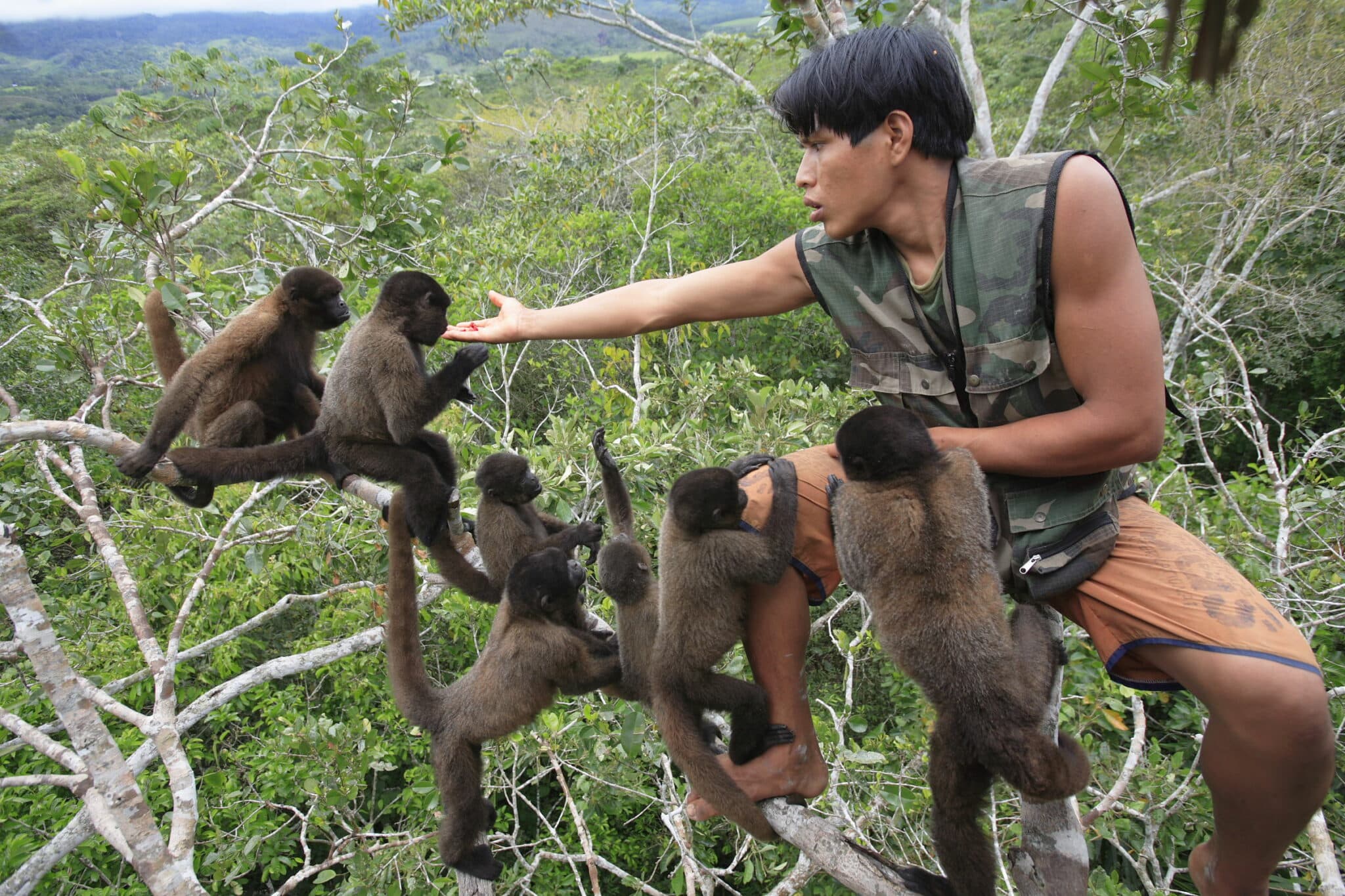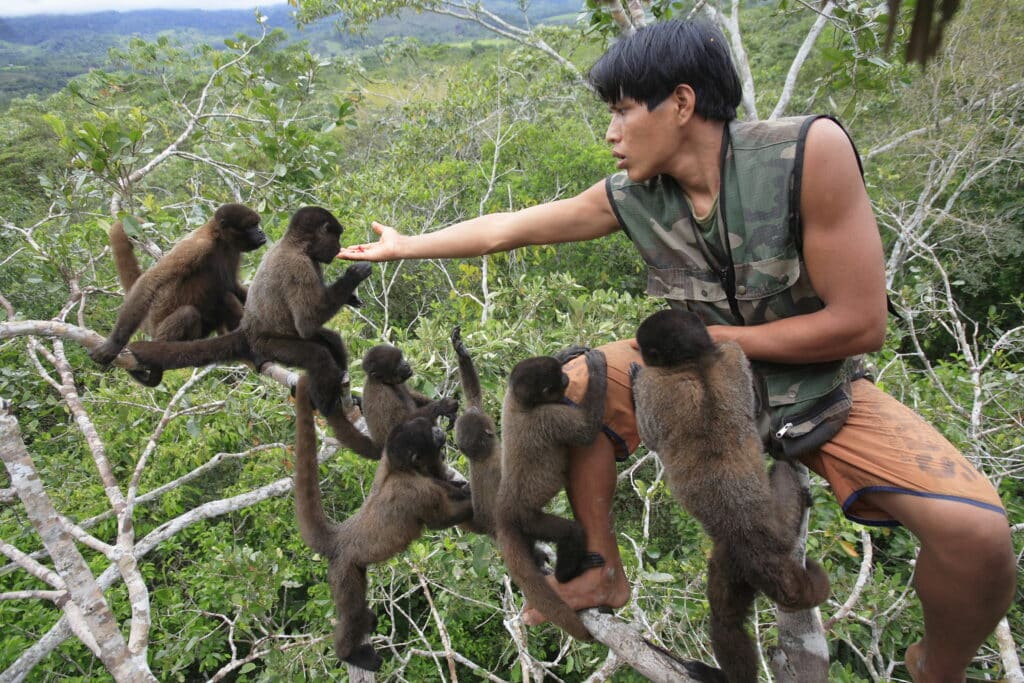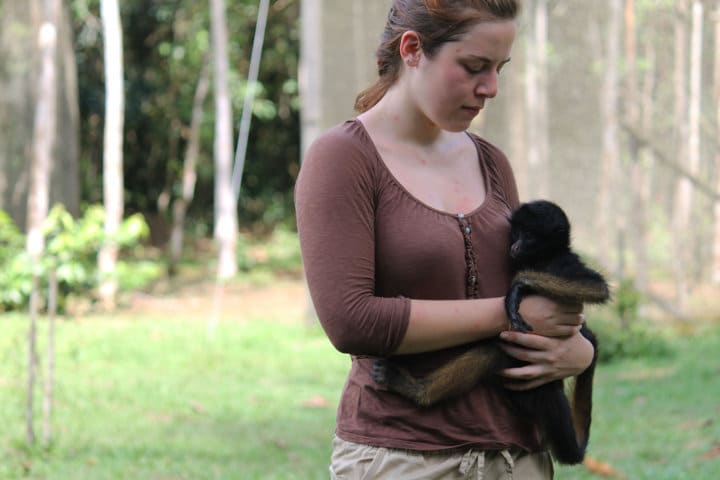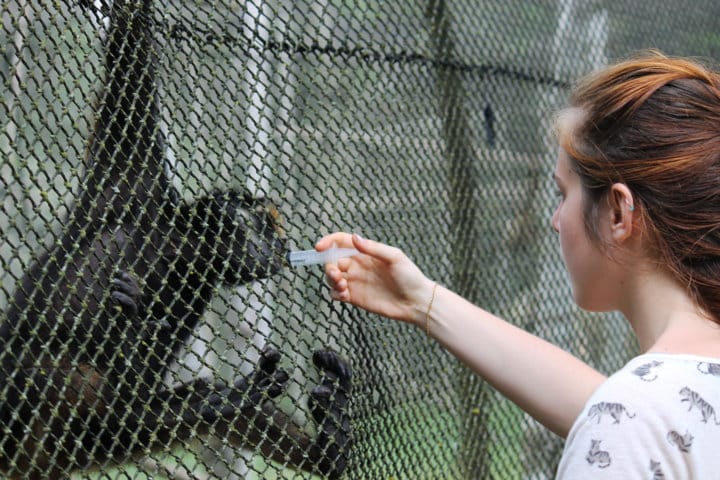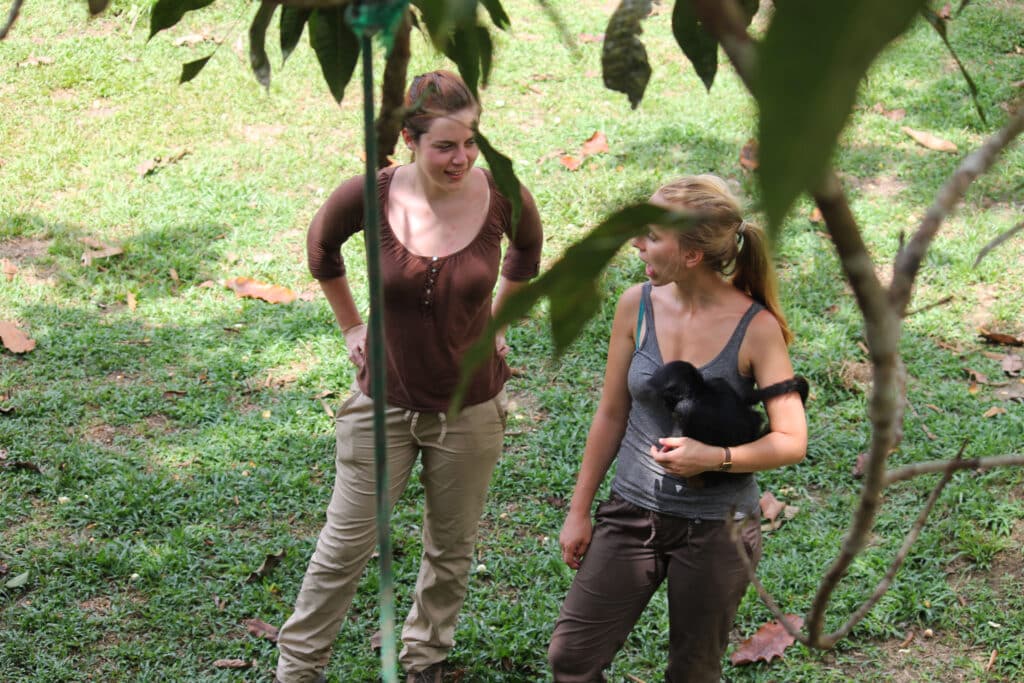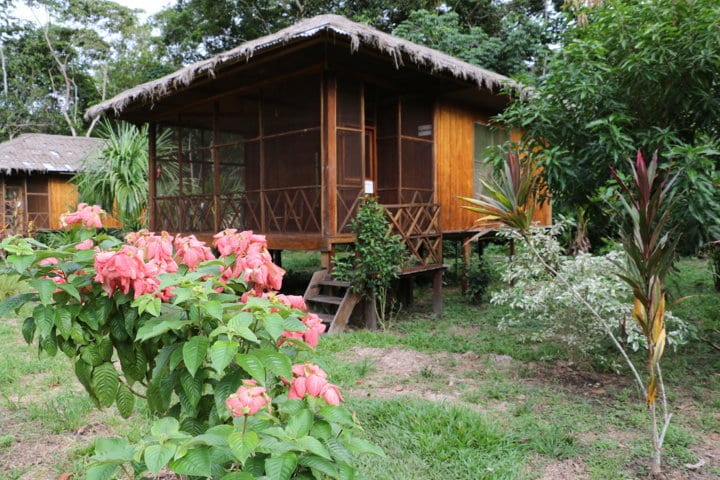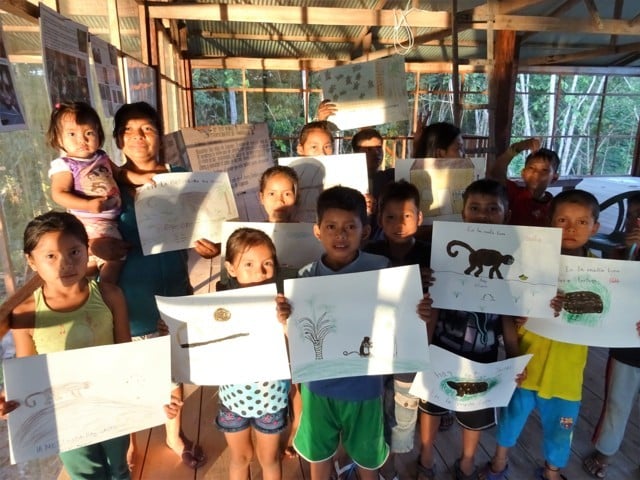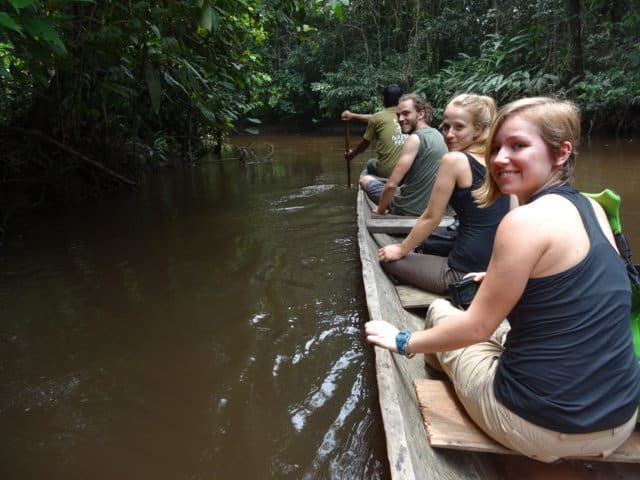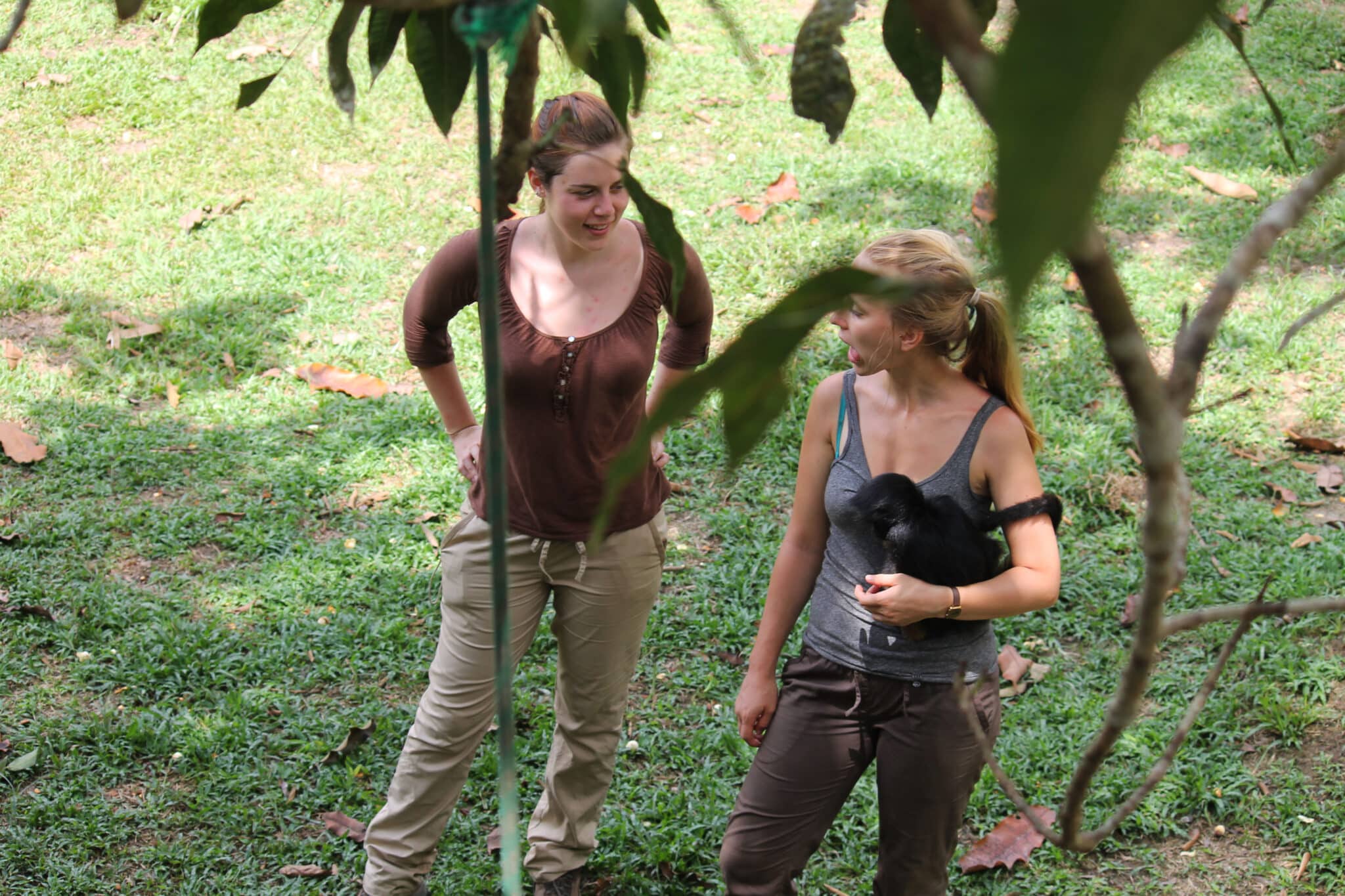Vous avez l’esprit aventurier ? Engagez-vous au sein d’un sanctuaire de réhabilitation des singes laineux et des singes araignées au coeur du bassin amazonien au Pérou. Toutes les missions ici
Réhabilitation des singes laineux et des singes araignées
Le projet de conservation est mené par une association franco-péruvienne créée en 1997, dont la principale mission est la lutte contre la destruction de la biodiversité et le trafic illégal d’animaux sauvages au Pérou. L’association a créé le centre de conservation La media Luna, pour y mener un programme de réhabilitation des singes laineux et atèles (belzebuth et chamek), en partenariat avec les communautés Awajun.
Au coeur du bassin amazonien
Ces espèces de primates, classées en « danger d’extinction » par la Liste Rouge de l’IUCN, sont en effet menacées par la destruction de la forêt et le braconnage. Plus 70% des animaux tués sont des femelles avec leur petit. Le sanctuaire La Media Luna se situe au cœur du bassin amazonien, aux portes de la réserve nationale Pacaya Samiria*. Il est devenu le lieu idéal pour la conservation de la vie sauvage, notamment avec l’acquisition de la forêt du Shiringal. Cette forêt, qui s’étend sur 60 hectares, abrite le centre de réhabilitation, appelé le Shiringal. Le Shiringal accueille des primates issus du trafic illégal d’animaux sauvages, qui peuvent ainsi vivre en semi-liberté dans une forêt secondaire.La Media Luna accueille également des aras et autres oiseaux d’Amazonie en réhabilitation et parfois des tortues terrestres et aquatiques.
Education environnementale
L’association mène des programmes de reboisement, d’éducation et de sensibilisation à l’environnement auprès de la population locale. Les efforts se portent sur l’éducation environnementale et le rétablissement des liens entre la culture traditionnelle et le respect de la vie sauvage.
L’équipe se rend régulièrement dans les communautés indigènes isolées pour des séances de cinéma itinérant et, plus récemment, pour proposer un spectacle de marionnettes. Un centre d’éducation environnementale, La Casa Kaysuni, vient d’être construit et accueille, à tour d rôle, les 300 enfants du quartier Chichipe le quartier des chasseurs.
* La réserve nationale Pacaya Samira, est également appelée “forêt des miroirs” en raison des reflets du ciel dans l’eau. Elle est la plus grande réserve naturelle du Pérou et s’étend sur 2 183 000 hectares. Formée d’une forêt inondée, elle représente un des hydro-écosytèmes les plus complexes de tout le bassin amazonien.
Vous devez faire un stage pour vos études ?
Stages de recherche
Les études proposées dans le cadre des stages de recherche font partie intégrante du travail de conservation mené par l’association. Principalement basées sur l’observation comportementale, elles visent à l’amélioration du bien-être des animaux hébergés dans le centre ou à l’évaluation de leurs capacités pour un retour à la vie sauvage. Les méthodes d’observation (éthologie) vous seront enseignées par votre encadrant qui vous aidera également à identifier et reconnaître les individus étudiés. Un temps devra être consacré chaque jour à la rédaction de votre mémoire et au traitement des données, en parallèle de la prise de données. La durée minimale de présence sur le terrain pour les stages est d’un mois, la première semaine étant consacrée à vous familiariser avec le protocole d’étude et les animaux étudiés.
Sujets d’étude possibles et temps de réalisation
- Détermination des liens sociaux chez un groupe d’aras de différentes sous-espèces en captivité (1 mois)
- Effet des enrichissements structurels sur l’activité d’un groupe d’atèles en captivité (1 mois à 1 mois ½, selon le nombre d’enrichissements testés)
- Détermination des liens sociaux chez un groupe d’atèles en captivité (1 mois à 1 mois ½)
- Etude du budget-temps d’activité chez un groupe de singes laineux en réhabilitation (suivi en forêt – 1 mois ½ à 2 mois, selon le nombre d’individus suivis)
- Etude des comportements alimentaires chez un groupe de singes laineux en réhabilitation (suivi en forêt – 1 mois ½ à 2 mois, selon le nombre d’individus suivis)
- Détermination des liens sociaux chez un groupe de singes laineux en réhabilitation (2 mois)
Stages de BTS-GPN – Gestion de la faune sauvage
Lors du stage de BTS-GPN, vous participez aux observations comportementales menées sur les singes atèles (en captivité) ou laineux (suivi en forêt). L’objectif est de repérer les individus aptes à intégrer les programmes de renforcement de populations sauvages.
Sensibilisation à l’environnement
Vous participez également au programme de sensibilisation à la protection de l’environnement de l’association. Ce programme est à destination des enfants des différents quartiers de Lagunas. En accord avec le maître de stage, vous élaborez des jeux pédagogiques ou élaborez de nouvelles scènettes pour le théâtre de marionnettes. Vous encadrerez, en tant que guide nature des sorties découvertes destinées aux écovolontaires en séjour à la Media Luna (selon vos connaissances).
inventaires faunistiques
Vous mènerez des inventaires faunistiques : Les milieux variés qui composent la Media Luna, le Shiringal et ses alentours accueillent une biodiversité importante. Il est cependant d’avoir, au préalable, de bonnes connaissances naturalistes. Aucun suivi pédagogique ne pourra vous être proposé sur place, veillez donc également à mettre au point votre méthode avec votre responsable de stage avant votre départ. Des guides sur les espèces locales d’oiseaux, de reptiles et d’amphibiens, réalisés par Hugo Foxonet et Adrien Maitrepierre, stagiaires BTS GPN 2017, sont disponibles sur place. Nous vous invitons à vous tourner davantage vers les inventaires ornithologiques, plus simples à mener.
Matériel indispensable aux stagiaires :
- Jumelles (pour les inventaires et le suivi des singes en forêt)
- Appareil photo recommandé
- Guides ornithologiques spécialisés sur l’Amazonie (pour les inventaires)
- Ordinateur + pack Office (Word, Excel, Power point)
- Logiciel de statistiques R (pour les stages de recherche)
- Attention : les instruments de capture et de manipulation sont interdits
Le rôle des écovolontaires
Si vous ne remplissez les conditions pour faire un stage, que vous avez en 18 et 30 ans et que vous êtes disponible au moins un mois, vous pouvez candidater pour une mission d’écovolontariat. Le rôle des écovolontaires est de soutenir les différentes activités du projet et l’équipe dans les tâches quotidiennes :
- Soins aux animaux : aide à la préparation des repas, nourrissage des oiseaux, nettoyage des enclos, distribution des vitamines
- Fabrication d’enrichissements structurels pour les enclos
- Réhabilitation des primates juvéniles : rôle de parent-substitut, accompagnement en forêt
- Observations comportementales des primates en réhabilitation : réalisées en forêt en suivant exclusivement les sentiers, en silence et toujours accompagné d’un encadrant (attention : il n’est en aucun cas permis de partir seul en forêt). Ces observations se font sous la supervision d’une doctorante en biologie, et d’un coordinateur diplômé et formé aux protocoles d’observation des primates.
- Suivi parasitaire des primates : collecte d’échantillons et aide aux analyses coprologiques dans le laboratoire de la Media Luna
- Plantations dans le cadre du programme de reboisement
- Education environnementale : théâtre de marionnettes, jeux, cinéma itinérant à destination des enfants dans les différents quartiers de Lagunas
- Lutte contre le trafic animal (viande de brousse et animaux de compagnie): rondes dans les différents quartiers, au marché central et au port de Lagunas, voire au marché de Yurimaguas, et prise d’informations
Horaires demandées : de 7h30 à 12h et de 14h à 17h du lundi au samedi. Un seul jour libre par semaine, sauf accord préalable avec les responsables. erte de la forêt secondaire du Shiringal et de la zone humide bordant le fleuve Huallaga
Les tâches auxquelles vous pourrez participer durant le séjour écosolidaire
Le séjour écosolidaire est un séjour participatif qui se déroule sur dix jours. Ni touriste conventionnel ni stagiaire ni écovolontaire, le voyageur écosolidaire marie découverte d’un milieu tout en agissant sur le terrain. Voici les activités auxquelles vous prendrez part
- Soins quotidiens aux animaux (aide à la préparation des repas pour les primates, nourrissage des oiseaux et nettoyage des enclos)
- Fabrication d’enrichissements pour les enclos
- Plantations dans le cadre du programme de reboisement
- Programme d’éducation environnementale : théâtre de marionnettes et jeux à destination des enfants de Lagunas
Aucune de ces activités n’a de caractère obligatoire.
Voici les sorties prévues lors de ce séjours écosolidaire
- Suivi des singes en forêt pour observation des comportements avec une primatologue
- Découverte de la faune et flore de la forêt secondaire du Shiringal
- Sortie en bateau le long du fleuve Huallaga, observation des oiseaux et des dauphins roses et gris d’Amazonie
- Sortie au jardin botanique de Don Benedicto:Sortie à l’atelier d’artisanat traditionnel amazonien de Liz et Rodolfo
- Sortie en bateau dans la zone d’amortissement de la réserve nationale Pacaya-Samiria: sortie diune et nocturne à la découverte de la faune et de la forêt primaire
- Visite de Lagunas
Les stages, écovolontariat et séjour écosolidaire sont ouverts des mois de juin à août 2024
Les stages
- De juin à août 2024
- Frais de séjour : 1 200 € (par personne et par mois)
- Un mois minimum
Inclus : logement ; nourriture ; encadrement par l’équipe sur place et par une scientifique pour la réalisation du programme
Non inclus : Assurance (obligatoire) ; billet d’avion ; effets personnels
Les missions d’écovolontariat
- Frais de séjour : 1 000 € (par personne et par mois) – A partir d’un mois
- Tarif spécial pour les soigneurs animaliers : 700 € (par personne et par mois)
Inclus : logement ; nourriture ; encadrement par l’équipe sur place
Non inclus : assurance (obligatoire) ; billet d’avion ; effets personnels
Séjour écosolidaire
- Frais de séjour : 950 € / personne – 10 jours
Inclus : logement ; nourriture ; encadrement par l’équipe sur place
Non inclus : assurance (obligatoire) ; billet d’avion ; effets personnels
Conditions de participation aux séjours d’écovolontariat
L’écovolontariat concerne toute personne âgée de 18 ans à 30 ans en bonne condition physique, désireuse d’apprendre, d’échanger et capable de vivre en communauté. Les personnes qui ont une formation en rapport avec l’environnement, la conservation, l’écologie, l’étude du comportement, les sciences vétérinaires, le soin animalier (avec une bonne expérience des primates) ou l’animation nature sont privilégiées.
La mission d’écovolontariat convient cependant aux étudiants provenant d’autres formations en année de césure ou aux personnes en réorientation vers les filières précédemment citées. Le séjour des écovolontaires sont encadrés par une responsable scientifique (docteur en biologie) et occasionnellement par un coordinateur diplômé en charge des écovolontaires.
Condition de participation aux stages
L’association propose des stages conventionnés adaptés aux étudiants en école vétérinaire (stages de participation à une recherche en biologie/ éthologie uniquement), BTS GPN et Licence de biologie/ écologie (ou en année de césure pendant des études de biologie/ écologie/ éthologie). Les stagiaires ont un encadrement spécifique à leur sujet d’étude, de la prise de données sur le terrain à l’élaboration de leur rapport/ mémoire. Tous les stages seront supervisés directement une scientifique, docteur en biologie, maître de stage et responsable scientifique de l’association.
Pour tous les types séjours
Pour tous les types de séjours, il est nécessaire :
- D’être en bonne conditions physique,
- De supporter de vivre en milieu reculé, sous un climat tropical…
- De faire preuve de respect pour la faune sauvage et l’équipe sur place.
Le climat
Saison des pluies de décembre à avril. Saison sèche de mai à octobre.
L’hébergement à la Media Luna
La Media Luna est installée sur les bords du fleuve Huallaga, un des grands affluents de l’Amazone. Elle comprend plusieurs grands bungalows traditionnels qui peuvent recevoir confortablement 2 à 3 écovolontaires chacun, avec salles de bains (douche, lavabo et toilettes sèches) et terrasses donnant sur le fleuve. Les draps, taies d’oreiller et serviettes ne sont pas fournis.
La nourriture
La nourriture locale est à base de poulet, œufs, poisson, riz, pommes de terre, manioc, bananes plantains et fruits. Tous les fruits ne sont pas disponibles en permanence. Vous êtes dans un endroit isolé qui vit en quasi autarcie, vous apprendrez à consommer comme les habitants d’Amazonie ce qui se produit en fonction des saisons. Les écovolontaires et stagiaires ont une cuisine à leur disposition, les repas sont préparés par une cuisinière le midi.
L’eau
L’eau fournie sur place est potable et ne pose pas de problème. Toutefois, si vous êtes très sensible sur le plan digestif, il faudra acheter de l’eau minérale sur place ou bien vous munir de pastilles micropur.
Lessive
Vous devrez donner votre linge à laver dans le village (2 € pour 20 pièces de linge environ), les réserves d’eau de la Media Luna n’étant pas suffisantes pour couvrir la consommation liée aux lessives à la main de tous.
Communication et Internet
Les portables de vos responsables sur place vous permettent d’être en contact avec Carlos et Hélène à tout moment, mais aussi de recevoir des appels (en cas de nécessité). Lagunas dispose actuellement d’un système Internet 3G, avec l’achat d’une carte SIM (10 sols – 3 €) et de forfaits mensuels Internet illimités à partir de 20 sols (5 €).
Comment rejoindre la mission facilement
Le trajet jusqu’au centre de conservation est à la charge des écovolontaires/ stagiaires. Vous prenez un vol international jusqu’à Lima, un vol intérieur de Lima à Tarapoto (1h15). Arrivée à Tarapoto vous avez la possibilité de voyager jusqu’au centre en toute sérénité, grâce à l’accompagnement que l’équipe organise pour vous. Un taxi connu de l’association viendra vous chercher à l’aéroport de Tarapoto et vous conduira en voiture jusqu’à l’hôtel El Naranjo à Yurimaguas où vous passerez la nuit (pas de réservation nécessaire). À votre arrivée, Claribel Huancho, accompagnatrice pour Ikamaperu, vous retrouvera à l’hôtel et vous emmènera acheter votre ticket de bateau au port pour votre départ le lendemain matin (à 5h du matin environ). Vous arriverez à Lagunas dans la matinée. Le motocatiste préféré de l’asssociation, Pinchi Luna, viendra vous chercher au port pour vous déposer au centre de la Media Luna.
Les plus du séjour !
Deux sorties découvertes en compagnie d’un guide local expérimenté sont comprises dans le séjour d’écovolontariat : Une expédition en bateau sur le fleuve Huallaga pour la collecte de graines et de plantes et pour l’observation des deux espèces de dauphins de rivière (gris et roses). Cette sortie en bateau sera l’occasion de découvrir l’avifaune locale.
Une sortie à la découverte de la forêt secondaire du Shiringal et de la zone humide bordant le fleuve Huallaga.
Pendant leur séjour à la Media Luna, les écovolontaires et stagiaires pourront visiter la réserve nationale Pacaya-Samiria avec un guide (visite de 3 jours minimum conseillée, prévoir 40 €/jour).
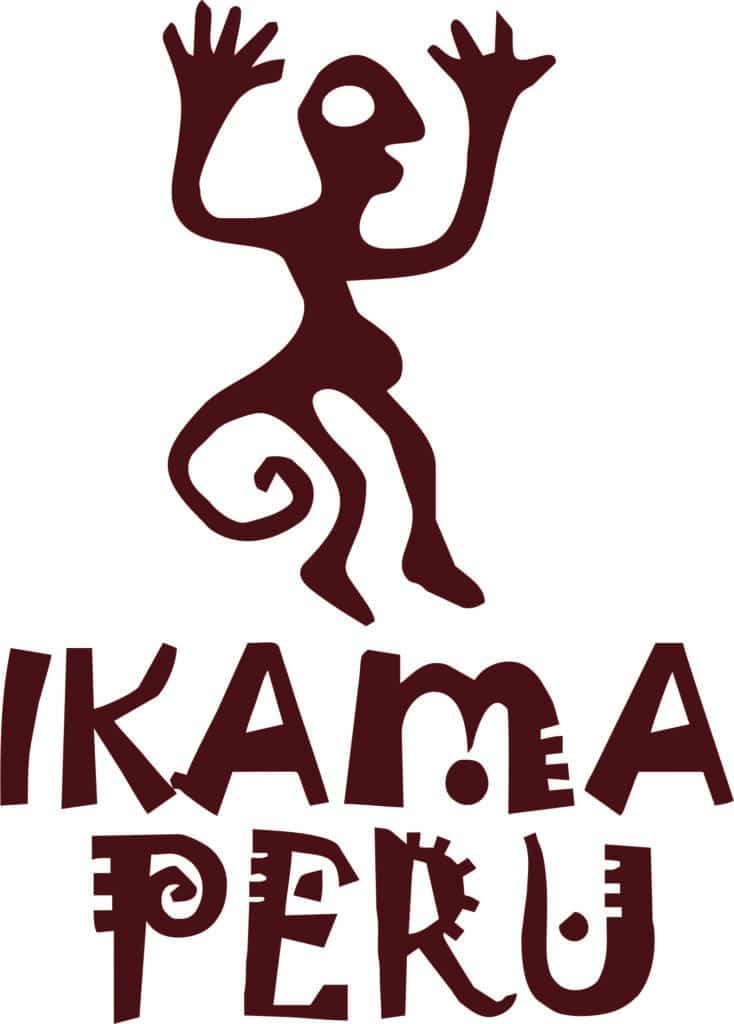
A propos de l’association partenaire
L’association partenaire s’appelle Ikamapéru. C’est une association française créée en 1997. Depuis 25 ans, son équipe agit à la conservation des primates menacés au coeur de la forêt amazonienne du Pérou avec la participation de la population locale et de la Réserve Nationale Pacaya Samiria. Ikamapéru est partenaire du PAL, de la Fondation Brigitte Bardot, 30 millions d’amis, la SECAS et l’International Primate Protection League

